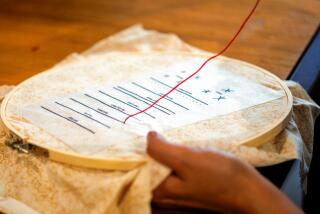SECOND OPINIONS : When the Third World Is in Your Own Back Yard : A distant academic topic comes home when a shopping trip leads to the discovery of a sweatshop where workers’ small children must fend for themselves.
- Share via
Current interest in the plight of the Thai garment workers who labored in sub-human conditions--for a paltry sum--brought to mind an incident that I experienced while teaching at Cal State Northridge.
My class on Third World women was coming along well. We had covered global sexism, multinationals, Marxist-feminism and recently concluded a study of “higglers,” independent market women of the Caribbean. They represent a small, emerging group of Third World women.
Higglers, the study found, work extremely long days: They rise at dawn to lug produce from local farms to the sellers market, staggering to town with the heavy loads as their children follow close. Often the children, too, share the burden. Among Caribbean women, the text claims, higglers enjoy a unique independence and privileges others do not: They joke and laugh throughout the day.
My students--many of them from underdeveloped countries--challenged this romanticized image of women who haul children and produce up and down treacherous mountains. Most of the higglers are single parents and the sole support of children whose fathers have either emigrated, abandoned the family or are working for low wages in the city. Thus, the burden of providing for children falls on the mothers. While the older children help sell produce, the “middle children,” those too young to be left alone and not old enough to work, are parceled out to neighbors and relatives, or left alone until late at night. Children of higglers have few options; their harsh lives are rooted in the economy. For them, education--books, desks, teachers--are a luxury.
The thought of small children left unattended for long periods rankled. That day, I left the classroom feeling terribly depressed, then drove home to my working-class community, still dwelling on the higglers. I stopped at an intersection on Foothill Boulevard where a brightly lit building that I’d never before noticed advertised clothes: “Nothing Over $20!” I made a U-turn, parked, then entered the store.
I felt revived by the array of wools, knits and cotton blends. I slipped into a wool jersey dress and waltzed to the mirror. Just then, a curtain behind the dressing room flew open. Out stalked a short woman, arms laden with blouses. She handed the clothes to a husky man inside a van, re-entered the store and disappeared into the back room.
I stood rooted to the spot, my mouth open in disbelief at what I saw in the dimly lit room: a row of sewing machines and crates full of cut sleeves, collars and yokes. At each machine slumped a dark-haired woman who swiftly fed the cut fabric into the machine while pressing a lever with her knee. The whir of machines filled the dank room.
*
Suddenly I saw movement along the far wall. Some little girls were quietly playing with scraps of material; a tiny boy slept against the wall. I pulled back the curtain to get a better look, but just then the short woman appeared.
Back in the dressing room the wool dress felt hot, itchy; the belt was too tight. I fumbled with the zipper, smoothed my hair and tried to make sense of what I had seen.
Like the higglers’ children--those not old enough for school and too young to be left alone--the children of the women who toiled here were apparently lugged, not to a Caribbean produce market, but to what appeared to be a sweatshop, smack in the middle of this bedroom community.
Guilt-stricken and shocked, I debated buying the dress. How could I reconcile myself to what I had witnessed? Must I report my suspicions to the authorities? If so, would the women lose their jobs, their employer a business? And what of the children? Would the INS send them back to Mexico? Central America?
I felt terribly sad at having witnessed the apparent exploitation of women and children in my back yard. In the end, I adjusted my purse, smoothed my suit jacket, paid for the dress and walked out the door. I did not look back.
More to Read
Sign up for Essential California
The most important California stories and recommendations in your inbox every morning.
You may occasionally receive promotional content from the Los Angeles Times.













